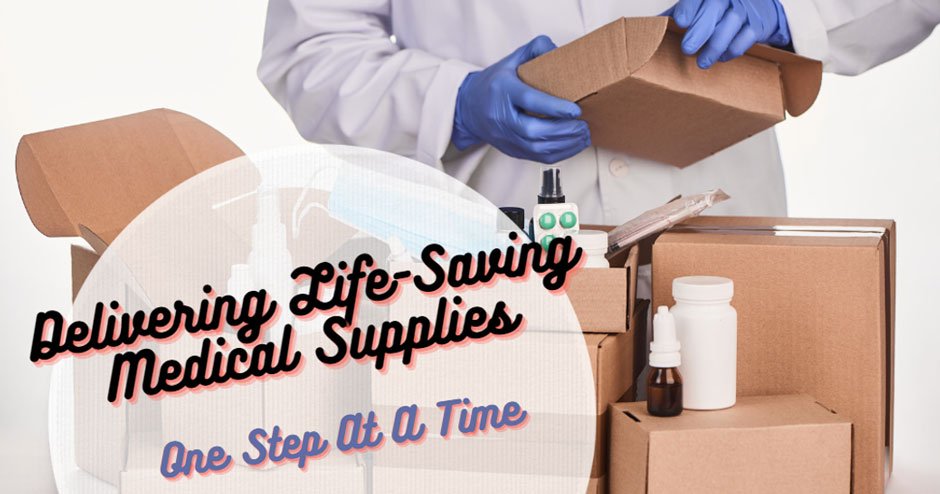You’re a busy medical professional, constantly ordering vital supplies to care for your patients. But what happens after you click “purchase”?
How do those fragile vials, sterile bandages, and precious medications safely make it to your clinic or hospital? Enter the unsung heroes of healthcare – medical courier services. These dedicated companies and couriers ensure your supplies are properly handled and delivered on time, no matter the distance or conditions. Join us as we explore the world of medical supplies courier who transport everything from blood samples to pacemakers.
You’ll gain a new appreciation for these delivery pros and the critical role they play in our healthcare system. Without them, doctors and nurses wouldn’t have what they need to provide quality care.
The Critical Role of Medical Supplies Couriers
As a medical supplies courier, you play an essential role in delivering life-saving medical equipment and medicines to healthcare facilities and patients. Your job requires efficiency, care, and timeliness to properly handle and transport delicate cargo.
Carefully Transporting Critical Shipments
You are responsible for picking up and dropping off medical supplies, equipment, samples, and medicines. These shipments often contain fragile and temperature-controlled items that must be properly handled and maintained during transport. Carefully loading, unloading and securing shipments in your vehicle helps ensure items arrive safely at their destination.
Meeting Strict Deadlines
In healthcare, timing is critical. Doctors, hospitals and patients rely on prompt delivery of medical supplies and equipment. You must pick up and drop off shipments according to a tight schedule. Efficient navigation, avoiding delays, and reaching destinations on time are key parts of your role. Late shipments could impact patient care, so you strive to meet delivery deadlines and communicate any issues immediately.
Maintaining Proper Conditions
Some medical supplies require climate-controlled conditions during transport. You monitor the temperature in your vehicle to ensure it remains suitable for the cargo. For cold items, you may use insulation, refrigeration or freezer packs to maintain a consistent temperature. Delicate equipment also needs to be properly secured so it is not damaged if your vehicle accelerates, brakes or turns sharply. You take great care to transport all medical shipments in the conditions required for each item.
Medical supplies couriers provide an essential service by delivering critical healthcare items to the right place at the right time. Your diligent work helps ensure doctors, hospitals and patients have the medical supplies and equipment they need. The care, timeliness and responsibility required for this role highlight its importance in the healthcare system.
Ensuring Safe and Timely Delivery of Medical Shipments
As a medical courier, you bear an immense responsibility to ensure life-saving medicines and supplies are delivered on time. This includes:
Careful Planning and Preparation
Preparing for a delivery starts long before you hop in your vehicle. Double check the shipment details, routing, and timeline to ensure everything is in order. Pack items securely with padding to prevent damage. Have backup supplies on hand in case of emergencies. Planning ahead minimizes errors and delays.
Safe Driving and Navigation
Your driving skills are just as important as your planning. Follow all traffic laws and drive cautiously, especially with urgent shipments. Know the quickest routes to your destination in case of traffic or road closures. Have maps on hand as a backup to GPS in areas with poor connectivity. Get the shipment there safely above all else.
Communication is Key
Stay in contact with the sender and recipient throughout the delivery process. Let them know once you’ve picked up the shipment and provide updates on your estimated arrival time. Inform them right away about any issues encountered along the route. Answer any questions they may have to put them at ease. Your communication and customer service can make a big difference, especially when lives are on the line.
Double Checking for Accuracy
Once you’ve arrived at your destination, double check that you have the correct shipment and paperwork before unloading. Carefully log any signatures required and provide the recipient their copy of documents. Take an extra few minutes to ensure all is in order – it’s better to be safe than face legal issues or delays in treatment down the line due to inaccuracies.
As a medical courier, following best practices for planning, driving, communication and accuracy helps guarantee shipments are delivered without a hitch. Lives depend on your skills and commitment to excellence. Take your role seriously and do your part to save lives, one delivery at a time.
Medical Courier Services: FAQs
When life-saving medical supplies need to get where they’re going, medical courier services ensure prompt, secure delivery. If you have questions about how these services work, here are some common FAQs:
What kinds of items do medical couriers transport?
Medical couriers handle everything from medications and vaccines to blood products, tissue samples, and medical equipment parts. Some also transport confidential patient records and test results between healthcare facilities. The items they carry are often time- sensitive, so speed and security are top priorities.
How quickly can medical couriers deliver supplies?
Most medical couriers offer same-day or overnight delivery for emergency shipments. Some also provide dedicated routes with regular scheduled stops to ensure frequent delivery of critical items. The delivery timeline will depend on factors like the shipment’s origin and destination, traffic and weather conditions, and any border crossings required.
Are medical courier vehicles specially equipped?
Yes, medical couriers use vehicles designed specifically for transporting healthcare materials. They are temperature-controlled and secure, with separate compartments to keep different types of items at the proper temperatures during transport. Some vehicles also have backup power systems in case of emergencies. All medical couriers follow strict procedures to maintain a sterile environment and ensure product integrity.
How are medical shipments tracked and monitored?
Sophisticated tracking technologies allow medical couriers to monitor shipments in real time. They use GPS to track vehicle locations and RFID tags to track the location of individual packages and their temperature. If there are any delays or temperature excursions during transport, the courier service and the recipient will be alerted immediately so they can take action if needed.
Are medical couriers properly trained?
Yes, medical couriers receive special training to properly handle and transport healthcare materials. They are trained in areas like safe handling procedures, temperature control, and ensuring product sterility. They also follow all relevant regulations for transporting medical items both domestically and internationally. Proper training and certification help minimize risks to product quality, patient safety, and healthcare compliance during the delivery process.
Conclusion
So there you have it. Medical supplies and equipment that save lives need to get from point A to point B, and medical couriers make that happen every day. It’s not always an easy job, dealing with traffic delays and inclement weather. But at the end of the day, medical couriers know their hard work is making a real difference for doctors, nurses, and patients who are counting on those supplies.
Next time you see a medical courier hustling a package from their vehicle into a clinic or hospital, take a moment to appreciate the critical role they play in healthcare. Because while we might not think much about it, they’re out there delivering lifesaving tools and technologies to those who need them most.





